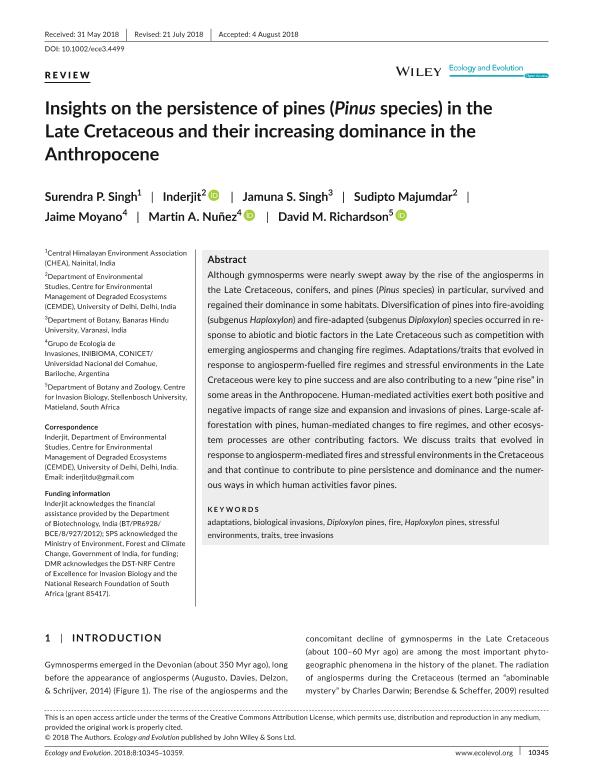Mostrar el registro sencillo del ítem
dc.contributor.author
Singh, Surendra P.
dc.contributor.author
Inderjit

dc.contributor.author
Singh, Jamuna S.
dc.contributor.author
Majumdar, Sudipto
dc.contributor.author
Moyano, Jaime

dc.contributor.author
Nuñez, Martin Andres

dc.contributor.author
Richardson, David M.
dc.date.available
2019-12-02T15:13:11Z
dc.date.issued
2018-10
dc.identifier.citation
Singh, Surendra P.; Inderjit; Singh, Jamuna S.; Majumdar, Sudipto; Moyano, Jaime; et al.; Insights on the persistence of pines (Pinus species) in the Late Cretaceous and their increasing dominance in the Anthropocene; John Wiley & Sons Ltd; Ecology and Evolution; 8; 20; 10-2018; 10345-10359
dc.identifier.issn
2045-7758
dc.identifier.uri
http://hdl.handle.net/11336/91081
dc.description.abstract
Although gymnosperms were nearly swept away by the rise of the angiosperms in the Late Cretaceous, conifers, and pines (Pinus species) in particular, survived and regained their dominance in some habitats. Diversification of pines into fire-avoiding (subgenus Haploxylon) and fire-adapted (subgenus Diploxylon) species occurred in response to abiotic and biotic factors in the Late Cretaceous such as competition with emerging angiosperms and changing fire regimes. Adaptations/traits that evolved in response to angiosperm-fuelled fire regimes and stressful environments in the Late Cretaceous were key to pine success and are also contributing to a new “pine rise” in some areas in the Anthropocene. Human-mediated activities exert both positive and negative impacts of range size and expansion and invasions of pines. Large-scale afforestation with pines, human-mediated changes to fire regimes, and other ecosystem processes are other contributing factors. We discuss traits that evolved in response to angiosperm-mediated fires and stressful environments in the Cretaceous and that continue to contribute to pine persistence and dominance and the numerous ways in which human activities favor pines.
dc.format
application/pdf
dc.language.iso
eng
dc.publisher
John Wiley & Sons Ltd

dc.rights
info:eu-repo/semantics/openAccess
dc.rights.uri
https://creativecommons.org/licenses/by/2.5/ar/
dc.subject
ADAPTATIONS
dc.subject
BIOLOGICAL INVASIONS
dc.subject
DIPLOXYLON PINES
dc.subject
FIRE
dc.subject
HAPLOXYLON PINES
dc.subject
STRESSFUL ENVIRONMENTS
dc.subject
TRAITS
dc.subject
TREE INVASIONS
dc.subject.classification
Ecología

dc.subject.classification
Ciencias Biológicas

dc.subject.classification
CIENCIAS NATURALES Y EXACTAS

dc.title
Insights on the persistence of pines (Pinus species) in the Late Cretaceous and their increasing dominance in the Anthropocene
dc.type
info:eu-repo/semantics/article
dc.type
info:ar-repo/semantics/artículo
dc.type
info:eu-repo/semantics/publishedVersion
dc.date.updated
2019-10-10T13:58:39Z
dc.journal.volume
8
dc.journal.number
20
dc.journal.pagination
10345-10359
dc.journal.pais
Estados Unidos

dc.journal.ciudad
Nueva York
dc.description.fil
Fil: Singh, Surendra P.. Central Himalayan Environment Association; India
dc.description.fil
Fil: Inderjit. University of Delhi; India
dc.description.fil
Fil: Singh, Jamuna S.. Banaras Hindu University; India
dc.description.fil
Fil: Majumdar, Sudipto. University of Delhi; India
dc.description.fil
Fil: Moyano, Jaime. Consejo Nacional de Investigaciones Científicas y Técnicas. Centro Científico Tecnológico Conicet - Patagonia Norte. Instituto de Investigaciones en Biodiversidad y Medioambiente. Universidad Nacional del Comahue. Centro Regional Universidad Bariloche. Instituto de Investigaciones en Biodiversidad y Medioambiente; Argentina
dc.description.fil
Fil: Nuñez, Martin Andres. Consejo Nacional de Investigaciones Científicas y Técnicas. Centro Científico Tecnológico Conicet - Patagonia Norte. Instituto de Investigaciones en Biodiversidad y Medioambiente. Universidad Nacional del Comahue. Centro Regional Universidad Bariloche. Instituto de Investigaciones en Biodiversidad y Medioambiente; Argentina
dc.description.fil
Fil: Richardson, David M.. Stellenbosch University; Sudáfrica
dc.journal.title
Ecology and Evolution
dc.relation.alternativeid
info:eu-repo/semantics/altIdentifier/url/https://onlinelibrary.wiley.com/doi/full/10.1002/ece3.4499
dc.relation.alternativeid
info:eu-repo/semantics/altIdentifier/doi/http://dx.doi.org/10.1002/ece3.4499
Archivos asociados
